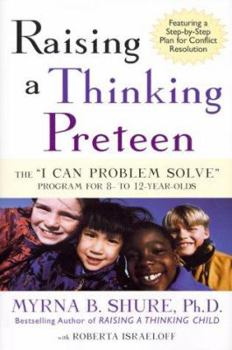Raising a Thinking Preteen: The "I Can Problem Solve" Program for 8- To 12-Year-Olds
Select Format
Select Condition 
Book Overview
In her bestselling Raising a Thinking Child , Myrna B. Shure introduced her nationally acclaimed "I Can Problem Solve" program, which helps four to seven-year-olds develop essential skills to resolve... This description may be from another edition of this product.
Format:Hardcover
Language:English
ISBN:0805059911
ISBN13:9780805059915
Release Date:April 2000
Publisher:Henry Holt & Company
Length:254 Pages
Weight:1.00 lbs.
Dimensions:1.0" x 5.8" x 8.6"
Customer Reviews
4 ratings
Good resource for parents
Published by Thriftbooks.com User , 20 years ago
Developmental psychologist Shure shares her method of encouraging kids to think for themselves, by learning and mastering a specific set of skills to become good problem solvers, make good decisions, and resolve conflict. Chapters discuss the wrong ways of parenting (explaining, suggesting, and overpowering) and recommends parents try the problem solving approach. Shure offers games to play to develop skills in such as thinking about how other people are feeling, recognizing conflicting emotion, planning alternative solutions, planning in a sequence, and considering consequences. A quiz at the end offers additional ways to test and hone these skills. At the beginning, Shute states that children must learn pro-social behaviors. Social withdrawl is not something one outgrows, and encourages adults to draw out the wallflower, loner types. Parental involvement is key. Examples were always very clear, but sometimes the answers seemed too perfect. Not every child is a textbook case. Most of the book focuses on three different children, and more cases or diffent types of children might have been included. Still the premise is good, modeling behavior is recommended, and the techniques appear to work. All of the studies she cites are 13-18 years old, a point of concern, and the book loses a bit of credibility. However, the ICPS method is supposed to very good for kids with ADHD, a current hot topic. Updated research would lend more authority to the work. She frequently makes reference to colleagues with giving much explaination of their work, a minor frustration. References are cited at the end in a bibliography oddly divided by chapter, but without numbered or detailed notes. The author kindly includes her own mailing address, email address and URL for questions, concern and feedback. Not having any children of my own to test Shure's theories out on, I hope to put them to use in dealing with some of the young adults I work with. Frustrated parents may find this book works for them; stock it in your parent teacher section.
Best for parents and teachers...
Published by Thriftbooks.com User , 21 years ago
Myrna Shure tells parents and teachers (from a cognitive-behavioral point of view) how to help 8- to 12-year-olds cope with ordinary and not-so-ordinary pressures of growing up. Her method is central to establishing a positive social emotional learning climate in a classroom. She also helps parents avoid the traps that parents fall into: power struggles, "telling" (i.e., ordering), "explaining," and so forth. Her belief is that if children in this group can "think" better about emotional issues, then they will handle the pressures of adolescence much better. Therefore, while her work addresses immediate issues of growing up in 8 to 12 year-olds, she also thinks "preventatively" about the 13 to 18 year-old group.Shure proposes teaching youngsters five fundamental skills: (1) understanding another's feelings and point of view; (2) understanding motives; (3) finding alternate solutions; (4) considering consequences; and (5) planning sequential steps to arrive at one's goals. Her emphasis is on the child's intrinsic motivation to do better and be part of a group, not on extrinsic rewards (as in "ordinary" behavior therapy).She has great empathy and flexibility with kids. You will see in this book a perceptive, creative, and sensitive grown-up working with kids and parents. You will learn how to develop and apply these five skills with children--either in your home or in your classroom. The I Can Problem Solve (ICPS) program is worth the ticket of admission, but to get a chance to "hear" her good heart is a double bonus.I also liked her time-frame. Children need time to grow. She is not an instant-fix-it expert. She respects kids enough to value their own pace, for themselves.
Where the rubber meets the road
Published by Thriftbooks.com User , 23 years ago
Wonderfully hands-on, this book really teaches the parent how to talk to the child in a way that is constructive, instead of so many of the destructive ways that we all, mostly unknowingly, fall into. This book and its predecessor, Raising a Thinking Child, should be used as textbooks for the parenting class everyone in America should be required to take before being allowed to have children.
Great book for improving parent-child communication!
Published by Thriftbooks.com User , 24 years ago
For anyone who wants a good relationship with their child that can hopefully last through the teen years, or wants to learn how to communicate effectively with their child, this book is a great start. If you have experienced the frustration of trying to "reason with" your child, and don't understand why your words are not working, this book really gives helpful guidelines on how to improve your methods of communication. If you find yourself yelling at your children, and experience that it just makes things worse, this book addresses this issue as well. It also tackles the problem of trying to think for your child. As a parent of a 7-year-old and a 4-year-old, this book will really help me to communicate and deal with my children in a way that nutures their growth as individuals who can really think for themselves.





